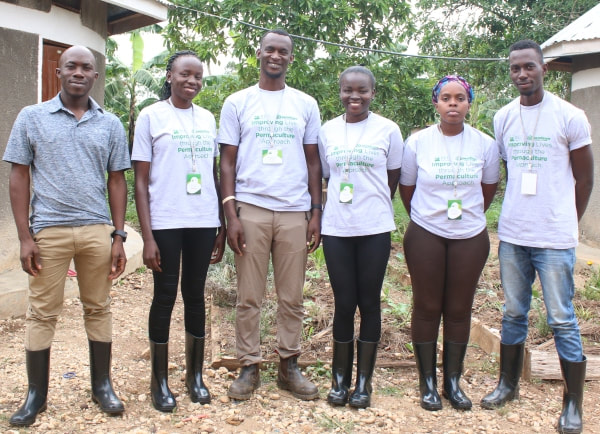Starting a New Phase
What an exciting summer this has been for permEzone as we review our first year launching the pilot program, and process the experience and knowledge we’ve gained to forge ahead into the future with the initiation of Phase 2!
Phase 1 Pilot - Settling In
What an exciting summer this has been for permEzone as we review our first year launching the pilot program, and process the experience and knowledge we’ve gained to forge ahead into the future with the initiation of Phase 2!
Phase 1 Pilot - Settling In
Project facilitator Paul Omollo and farmer Mr. John Wao discussing appropriate techniques for controlling coffee berry disease
Paul Omollo and Reagan Okoth, our boots on the ground permaculture trainers and program facilitators, report good progress with the farmers in Asumbi. They met with the farmers for the first Training Review Forum and received very positive feedback from the farmers in terms of how much they remember from the training and how motivated they are to start work on their model farms. They have also completed the baseline survey, and are liaising with Elin L Duby, who is on the permEzone Project Board, to document the results for MEL (Monitoring, Evaluation and Learning).
Ms. Helida Akinyi at her farm during the land preparation stage in readiness for the short rains season
Phase 2 Pilot - Gearing Up!
Huge news- we have signed the Memorandum of Understanding with our new collaborators Broadfield Enterprises Uganda - Permaculture Group, BEU thus officially initiating Phase 2 of the pilot! We have now begun a 4-month period of planning, preparation and fundraising so that we’re ready to start the training in January or February 2019.
Phase 2 will focus on a single group of 20 representative farmers in Sanje village in the central region of Uganda, to receive the training and go on to create model farms. From this group of 20, the project aims to work with 300-400 smallholder farmers through farmer-to-farmer extension work.
Huge news- we have signed the Memorandum of Understanding with our new collaborators Broadfield Enterprises Uganda - Permaculture Group, BEU thus officially initiating Phase 2 of the pilot! We have now begun a 4-month period of planning, preparation and fundraising so that we’re ready to start the training in January or February 2019.
Phase 2 will focus on a single group of 20 representative farmers in Sanje village in the central region of Uganda, to receive the training and go on to create model farms. From this group of 20, the project aims to work with 300-400 smallholder farmers through farmer-to-farmer extension work.
The BEU Team - from left to right: Peter Bukenya- BioGas Designer and Trainer, Juliana Lanyero - Finance and Trainer, Charles Mugarura- Team Leader, Mercy Kayoddi- Trainer, Victoria Abigaba - Field Trainer, Emmanuel Walusimbi- Visual Data Developer.
Who is BEU?
Broadfield Enterprises Uganda, was founded in 2012 by Charles Mugarura, and they have created and operate a wide-ranging array of projects and programs, and have built a strong team with a diverse skill-set including 6 years’ experience teaching permaculture.
BEU’s focus is on creating and implementing innovative climate change adaptation strategies using the permaculture ethics and principles to solve Uganda’s problems, especially with the most vulnerable populations of rural communities of whom the majority are farmers.
One project of note that brings BEU into synergy with permEzone is PermApp which is now under development. PermApp is a mobile platform that allows farmers to access services and exchange information with other farmers and access more summarized knowledge on permaculture techniques. This belief that technology will play a big role in advancing permaculture unites permEzone and BEU, proving out the impact of technology in regenerative development for rural communities.
To learn more about the BEU team and the ambitious work they are engaged in, see here.
Broadfield Enterprises Uganda, was founded in 2012 by Charles Mugarura, and they have created and operate a wide-ranging array of projects and programs, and have built a strong team with a diverse skill-set including 6 years’ experience teaching permaculture.
BEU’s focus is on creating and implementing innovative climate change adaptation strategies using the permaculture ethics and principles to solve Uganda’s problems, especially with the most vulnerable populations of rural communities of whom the majority are farmers.
One project of note that brings BEU into synergy with permEzone is PermApp which is now under development. PermApp is a mobile platform that allows farmers to access services and exchange information with other farmers and access more summarized knowledge on permaculture techniques. This belief that technology will play a big role in advancing permaculture unites permEzone and BEU, proving out the impact of technology in regenerative development for rural communities.
To learn more about the BEU team and the ambitious work they are engaged in, see here.
Update on the Mobile Phone Platform
Earlier this year we were able to test a proof of concept mobile platform for farmers to share their experiences and knowledge by SMS. After initial testing and discussion, we determined that we need to experiment with voice services, to support farmers who find SMS challenging due to their levels of literacy.
We then developed some proof of concept voice features including broadcasting a recorded newsletter and polls that enable farmers to respond to surveys. This process has demonstrated that we have the technical capability for this service, although we also learned that this approach will be more challenging and time consuming to implement.
We've incorporated these lessons into the planning of Phase 2 to ensure that our extension workers have the training and time needed to help support this service on the ground. In the meantime, we are exploring simpler options for our Phase 1 farmers as we look to support them over the next 18 months of their pilot.
Earlier this year we were able to test a proof of concept mobile platform for farmers to share their experiences and knowledge by SMS. After initial testing and discussion, we determined that we need to experiment with voice services, to support farmers who find SMS challenging due to their levels of literacy.
We then developed some proof of concept voice features including broadcasting a recorded newsletter and polls that enable farmers to respond to surveys. This process has demonstrated that we have the technical capability for this service, although we also learned that this approach will be more challenging and time consuming to implement.
We've incorporated these lessons into the planning of Phase 2 to ensure that our extension workers have the training and time needed to help support this service on the ground. In the meantime, we are exploring simpler options for our Phase 1 farmers as we look to support them over the next 18 months of their pilot.
Fundraising Campaign Preparing to Launch
Before we can embark on the next leg of the journey towards self-sustained regeneration of the planet and local economies, we need to gather additional funds to make our dreams a reality.
We will shortly be launching a fundraising campaign to raise $28,000 for Phase 2 of the pilot which would cover these four stages of program implementation, as well as the costs of independent evaluation of outcomes:
Stage 1 - Preparation: 4 months. Includes initial recruitment of farmer network, selection of representative farmers, baseline survey, and participatory development of curriculum and MEL framework.
Stage 2 - Training: 3 months. Delivery of agreed curriculum through training to representative farmers.
Stage 3 - Support and Extension: 18 months. On-farm support of lead farmers, developing and implementing their farm designs, recruitment of additional farmers to network, and initiation of farmer-to-farmer extension work.
Stage 4 - New Stage - Consolidation: 3 months. Completion of direct support and extension work with representative farmers, with specific focus on facilitating the development of the Community of Practice.
With the addition of this new last phase, we hope to ensure that we do everything we can to achieve our key goal of creating a new Community of Practice. To do this we will consolidate the process of social change and help prepare the farmers to maintain the momentum of change long after the permEzone project has finished.
This will be a continuation of the process of supporting the farmers in developing their farms and becoming farmer-to-farmer extension workers, but with an added focus on facilitating a community process that develops the invisible systems needed to reinforce new norms over time while providing practical support for building the resilience of the local economy.
Before we can embark on the next leg of the journey towards self-sustained regeneration of the planet and local economies, we need to gather additional funds to make our dreams a reality.
We will shortly be launching a fundraising campaign to raise $28,000 for Phase 2 of the pilot which would cover these four stages of program implementation, as well as the costs of independent evaluation of outcomes:
Stage 1 - Preparation: 4 months. Includes initial recruitment of farmer network, selection of representative farmers, baseline survey, and participatory development of curriculum and MEL framework.
Stage 2 - Training: 3 months. Delivery of agreed curriculum through training to representative farmers.
Stage 3 - Support and Extension: 18 months. On-farm support of lead farmers, developing and implementing their farm designs, recruitment of additional farmers to network, and initiation of farmer-to-farmer extension work.
Stage 4 - New Stage - Consolidation: 3 months. Completion of direct support and extension work with representative farmers, with specific focus on facilitating the development of the Community of Practice.
With the addition of this new last phase, we hope to ensure that we do everything we can to achieve our key goal of creating a new Community of Practice. To do this we will consolidate the process of social change and help prepare the farmers to maintain the momentum of change long after the permEzone project has finished.
This will be a continuation of the process of supporting the farmers in developing their farms and becoming farmer-to-farmer extension workers, but with an added focus on facilitating a community process that develops the invisible systems needed to reinforce new norms over time while providing practical support for building the resilience of the local economy.







 RSS Feed
RSS Feed